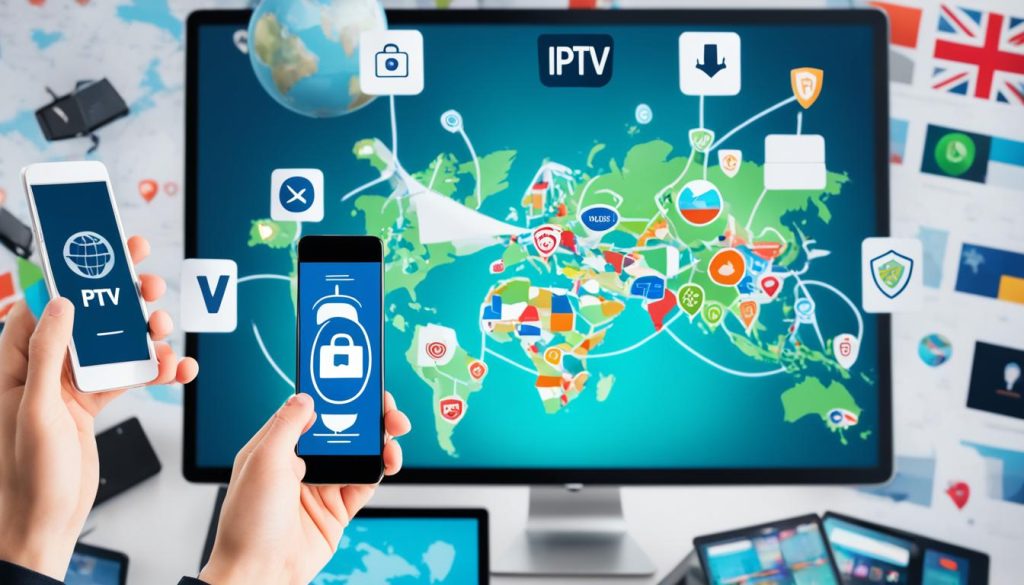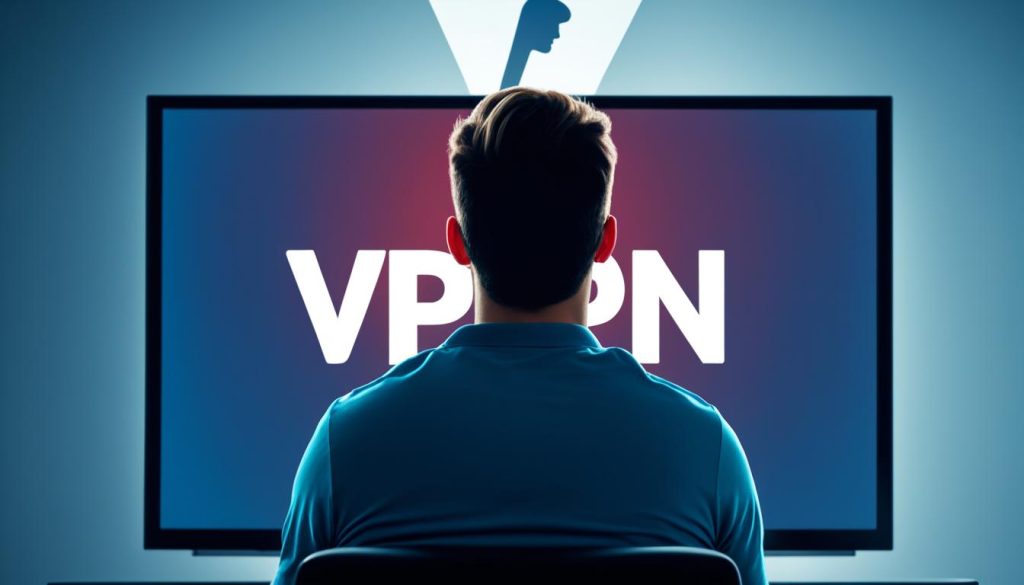As the world of television continues to evolve with the advancements in internet capabilities, the question arises: do I need a VPN for IPTV? For many viewers seeking secure IPTV viewing, the answer is increasingly affirmative. A VPN provides a fortress of digital privacy and security, ensuring that one’s online activities, particularly when indulging in the comforts of IPTV streaming, remain confidential and inaccessible to prying eyes. The practicality of a VPN for IPTV streaming extends beyond mere security; it is a gate-pass to a world of unrestricted content, seamlessly bypassing geographical barriers to deliver a diverse and rich viewing experience.
Key Takeaways
- Understanding the necessity of a VPN for safeguarding online privacy during IPTV streaming.
- Assessing the benefits of a VPN in providing secure IPTV viewing experiences.
- Exploring how VPNs help in circumventing geo-restrictions for enhanced IPTV streaming content access.
- Recognising the role of VPNs in maintaining anonymity while using IPTV services.
- Appreciating the value a VPN adds to IPTV streaming through encryption and IP masking.
- Considering the broader content possibilities made available by using a VPN for IPTV streaming.
Understanding IPTV Streaming and Its Growth in Popularity
The landscape of television entertainment has undergone significant shifts, with IPTV streaming emerging as a key player in this evolution. The seamless integration of convenience, choice, and user control makes IPTV an increasingly preferred option over traditional broadcast methods. This section delves into the workings of IPTV and explores the factors contributing to its escalating popularity.
What is IPTV and How Does It Work?
IPTV, or Internet Protocol Television, signifies a paradigm shift in how viewers consume media. Rather than being limited to a broadcaster’s schedule, IPTV leverages internet technology to deliver television services. This method facilitates live streams as well as on-demand content that can be accessed via various devices, underpinning the notion of television anytime, anywhere. Central to this are the servers that host content and the networks that deliver these programs to homes through internet connections, essentially replacing conventional cable and satellite services.
The Rise of IPTV in the Streaming Landscape
Coupled with the growth of IPTV, is the expanding role of VPNs—Virtual Private Networks—which are instrumental in enhancing the IPTV viewing experience. A critical aspect behind the rise of IPTV streaming is the adaptability it offers, providing a personal, tailored viewing experience. The how VPN works for IPTV conundrum is straightforward yet ingenious; it cloaks users’ online footprints, potentially safeguarding them from ISP snooping and simultaneously facilitating access to geographically restricted content—a boon for avid streamers. With encapsulated data packets and masked IP addresses, VPNs are the unsung heroes of secure and borderless IPTV streaming.
As we witness the growth of IPTV technology and the robust infrastructure supporting it, it is clear that the confluence of internet proficiency and consumer demand is fuelling this trend. The table below offers a glimpse into the vast potential and dynamic nature of IPTV’s market growth, highlighting key statistics that showcase its soaring trajectory.
| Year | Global IPTV Subscribers | Percentage Increase |
|---|---|---|
| 2019 | 200 million | – |
| 2020 | 250 million | 25% |
| 2021 | 300 million | 20% |
| 2022 | 350 million | 16.7% |
The figures speak volumes about the burgeoning appeal of IPTV, an appeal that is only set to intensify as advancements in technology and internet services continue to evolve. In a realm where consumers are king, IPTV and VPNs together are redefining the very fabric of digital entertainment, granting unprecedented command over what, when, and how audiences engage with content.
Do I Need a VPN for IPTV: Analysing the Benefits
As the landscape of digital entertainment rapidly evolves, IPTV users are increasingly recognising the importance of VPN for IPTV to enhance their viewing experience. Let’s delve into the key advantages and understand how a VPN can protect IPTV with VPN technology effectively.
The primary benefits of VPN for IPTV include security and anonymity, both paramount in today’s digital world. By routing your connection through encrypted tunnels, VPNs shield your online activity from prying eyes, including your Internet Service Provider (ISP), who might otherwise monitor and throttle your bandwidth when detecting heavy streaming activity. This preventative measure keeps your streaming smooth and buffer-free.
Enjoying unrestricted access to international content eliminates virtual borders, making the world of IPTV your oyster.
Another cornerstone of VPN utility lies in its capacity to bypass geographical restrictions. With the ability to connect to servers worldwide, users can unlock and savour international channels and exclusive content otherwise off-limits—a crucial feature for expats and enthusiasts of global media.
Below is a compilation of the reasons why protecting your IPTV service with a VPN is not just a luxury, but a necessity:
- Securing your connection against bandwidth throttling
- Preserving anonymity, especially in regions with stringent internet regulations
- Opening up a world of content, from far-off international exclusives to niche channels
Conclusively, the benefits of VPN for IPTV are undeniable, offering users a more robust and encompassing streaming experience. It fortifies the standpoint that the integration of VPN technology with IPTV is less about luxury and more about securing a keystone in personal entertainment elevation.
How VPN Works for IPTV: Enhancing Your Streaming Experience
With the increasing demand for personalised and on-demand television, it’s no surprise that IPTV has become a household name. However, for a truly enhanced streaming experience that includes security, privacy, and global content access, understanding how VPN integrates with IPTV is essential. Let’s delve into the mechanics of this fusion.
VPN Technology Explained
Essentially, a VPN (Virtual Private Network) creates a protective tunnel around your internet data, ensuring that what you stream via IPTV does not fall into the wrong hands. This is one of the prominent VPN advantages for IPTV,as it secures your connection from potential intruders and hides your browsing activities from ISPs and third-parties. Your original IP is replaced with one from the VPN’s server, meaning that your digital footprint is thoroughly camouflaged.
Improving Access and Overcoming Geo-restrictions
One of the compelling reasons to use VPN for IPTV is the ability to bypass geographical limits set on content. Whether it’s a hit show exclusive to a foreign network or a live event not broadcasted in your region, a VPN opens up the gates to global content libraries. By changing your IP address, you can access geo-restricted IPTV channels and services from anywhere in the world — a significant aspect of VPN for secure IPTV streaming. Moreover, overcoming these restrictions can also offer access to better subscription deals and services only available in other markets.
In summary, utilising a VPN not only safeguards your streaming from potential cyber threats but also substantially broadens your entertainment horizons.
The Importance of VPN for IPTV: Security and Privacy Considerations
When streaming content through an IPTV box, the sanctity of personal viewing preferences and sensitive data can be compromised by the unsecured nature of the internet. A robust approach to digital security and privacy is not just recommended; it is essential. In this context, the role of a VPN in bolstering the security apparatus for IPTV users cannot be overstated, with particular focus on its legality, capability of securing streaming activities, and suitability for IPTV boxes.
Protecting Sensitive Data and Anonymity Online
The intrusion into one’s digital life, capable of revealing a treasure trove of personal information, is a looming threat that necessitates the use of a VPN. Employing a VPN for IPTV legality concerns helps to create a shielded network environment that is impervious to unwanted scrutiny. Viewers are thus granted peace of mind, knowing their habits and choices remain invisible to prying eyes.
Securing Your Connection and Preventing ISP Throttling
One cannot discount the pervasive practice of ISP throttling, which severely hampers the viewing experience. The strategic implementation of a VPN for an IPTV box can counteract such arbitrary limitations, assuring an uninterrupted and high-quality streaming experience. The encryption brought by a VPN cloaks the user’s activities, securing IPTV with a VPN and providing a seamless gateway to diverse entertainment content without the fear of degradation in speed or quality.
| Need for VPN | Benefits | Impact on Privacy | Impact on IPTV Streaming Quality |
|---|---|---|---|
| Legal Protection | Ensures compliance with copyright laws | Encrypts user data to prevent monitoring | Stable streaming without ISP interference |
| Anonymity | Masks IP address from unwanted surveillance | Keeps viewing preferences private | Prevents targeted throttling by ISPs |
| Security | Safe connection for transactions and data transfer | Protects against data breaches and cyber-attacks | Ensures encrypted connection for consistent streaming |
In summary, a VPN emerges as a paramount tool in the quest for protecting one’s digital footprint while indulging in IPTV streams. The legality of VPN for IPTV usage dovetails with the imperatives of security, underscoring the relevance of VPNs in contemporary media consumption. As the vanguard of online discretion and reliability, VPN technology heralds a new era of fortified privacy and enriched user experience for IPTV boxes all over the United Kingdom.
Why Use VPN for IPTV: Content Accessibility and Censorship
In an ever-connected world where digital content crosses boundaries, IPTV users continually seek ways to expand their viewing repertoire. The use of VPN is not simply a tool for online privacy, but an essential asset for accessing global IPTV channels, unlocking geo-restricted IPTV content, and bypassing censorship with VPN. To retain a degree of freedom over their media choices, audiences turn to VPN solutions that promote a world without digital borders.
Accessing International Channels and Exclusive Content
The pursuit of diverse and rich content has led to the popularity of VPNs among IPTV enthusiasts. A key advantage of a VPN is its ability to mask your IP address, allowing you to take on a digital identity in a country where certain shows or channels are freely available. By bypassing censorship with VPN, viewers can indulge in exclusive programs from broadcasters around the globe without leaving the comfort of their home.
Navigating through Geo-blocks and Censorship Barriers
Many users face the frustration of geo-blocks, a mechanism used by content providers to restrict access based on geographical locations. A VPN serves as the ultimate tool for unlocking geo-restricted IPTV content, ensuring that one’s geographical location is no longer a barrier to entertainment. The ability to watch the latest shows from any country solidifies the role of VPNs as a cornerstone of modern IPTV viewing.
| Capabilities | Benefits |
|---|---|
| VPN masks IP address | Enables anonymous streaming |
| Encrypted connections | Secure transmission of viewing data |
| Global server availability | Access to international content libraries |
| Bypassing geo-restrictions and censorship | Unrestricted access to films and TV series |
Ultimately, a VPN not only elevates the IPTV experience by unlocking geo-restricted IPTV content but also provides a freedom to broadcast consumption that is invaluable in the contemporary digital landscape.
Risks of Not Using VPN for IPTV: Potential Exposures
The allure of on-demand television is undeniable, yet the risks of not using VPN for IPTV can cast a long shadow over your streaming experience. In a world where digital privacy is paramount, neglecting to use a VPN might leave you vulnerable on multiple fronts. Understanding these risks is not just about compliance, but also about safeguarding your online presence.
IPTV streaming has revolutionised how we consume media, offering a convenient and customisable viewing experience. However, with the ease of access comes concerns around IPTV streaming legality and security. Let’s delve deeper into understanding these concerns.
Understanding the Legalities of IPTV Streaming
The legal aspects of IPTV can be intricate. Many services may operate without the requisite licenses, creating a murky legal terrain for unwitting viewers. This means, without the protective layer of a VPN, you may inadvertently engage in copyright infringement, putting you at risks of not using VPN for IPTV that extend beyond simple privacy concerns.
Streaming content via IPTV without a safeguard in place can draw the attention of authorities and potentially expose consumers to legal action, especially if the service used is later deemed illegitimate. It is imperative to stay informed about the IPTV streaming legality in your region to conscientiously align your viewing habits within the bounds of the law.
Cyber Risks: Hacking and Malware Threats
A discussion about the vulnerabilities of unsecured IPTV cannot exclude the ever-looming threat of cyberattacks. Hacking and malware are genuine concerns that can compromise personal data and interfere with the integrity of your home network. Protecting IPTV from hacking should not be taken lightly, as unencrypted streams become easy prey for malicious entities lurking in the digital realm.
VPNs create secure connections and shield your data from nefarious actors, ensuring your IPTV experience is not just private but also safe from potential cyber threats. Making the sensible choice to use a VPN while streaming IPTV is the equivalent of putting a robust lock on your digital door.
| Without VPN | With VPN |
|---|---|
| Potential legal repercussions for accessing unlicensed content | Enhanced privacy, reducing the risk of legal issues |
| Internet Service Provider (ISP) can monitor streaming activities | Encrypted connection hides activity from ISPs |
| Susceptible to hacking and cyber threats | Protected from hacking, bolstering cyber security |
| Exposure to malware through unsecured streams | Secured connection helps prevent malware infections |
In conclusion, while the risks associated with foregoing a VPN might seem daunting, the solution is simple—invest in a reliable VPN service. Doing so speaks to a deeper understanding of digital stewardship, where protecting IPTV from hacking, upholding IPTV streaming legality, and mitigating the risks of not using VPN for IPTV are paramount for a secure, uninterrupted, and conscientious streaming experience.
Choosing a VPN for IPTV: Key Features to Look Out For
When delving into the world of IPTV streaming, selecting the best VPN for IPTV is paramount to a secure and enjoyable viewing experience. Various factors come into play, from speed to server locations, and most importantly, an uncompromising commitment to privacy through a no-log policy.
Server Locations and Speed
Having a wealth of server options across different countries not only enhances the potential to unlock geo-restricted content but also ensures robust connectivity and minimal lag. After all, one of the critical aspects of choosing a VPN for IPTV hinges on the service’s ability to provide seamless streaming without the dreaded buffer wheel.
No-Logging Policy and User Privacy
The assurance that comes with a no-log VPN for IPTV is vital for users who cherish their privacy. A strict policy means that the VPN provider does not track or store logs of your browsing activity, viewing history, or metadata, thus safeguarding your digital footprint.
| Feature | Why It Matters | What to Look For |
|---|---|---|
| Server Distribution | Impacts accessibility and quality of IPTV streams | VPN with a broad network of servers globally |
| Connection Speed | Affects streaming quality – no one enjoys buffering | High-speed servers that can handle HD and 4K streams |
| No-Log Policy | User privacy is paramount | VPN that doesn’t track or store any of your data |
| Simultaneous Connections | Allows multiple devices on one VPN account | Offers 5 or more simultaneous connections |
| Customer Support | Helps resolve issues promptly | 24/7 customer support with multiple contact options |
The goal is to strike the perfect balance between extensive coverage and uncompromised speed, all the while maintaining an ironclad protection of your personal data. Bear these benchmarks in mind, and you will find yourself equipped with the best VPN for IPTV, ensuring a secure and smooth streaming experience.
VPN for IPTV Box: Integrating VPN with Your Device

As the landscape of home entertainment shifts towards internet-based services, integrating a VPN with your IPTV box has become crucial to maintain both the legality of streaming and the breadth of accessible content. The seamless operation of a VPN for IPTV legality is underpinned by its ability to ensure users are navigating legal streaming pathways while accessing legal IPTV services. In this section, we explore the necessary steps to set up a VPN across various devices and consider the compatibility issues with IPTV boxes and Smart TVs.
Setting Up VPN on Various IPTV Devices
Selecting a VPN provider that extends support to IPTV devices is a primary step for viewers keen on harnessing the full potential of their subscriptions. Most established VPN providers offer dedicated applications designed for different platforms, including those tailored for IPTV boxes. The setup process is typically streamlined: users are required to download the app, install it, then log in to the VPN service, following which connection to the appropriate server is just a few clicks away.
Compatibility with IPTV Boxes and Smart TVs
Ensuring a VPN’s compatibility with your IPTV box or Smart TV is imperative for uninterrupted streaming. While most modern devices jealously guard their user-friendliness trait, older models might necessitate manual configurations. To safeguard your viewing pleasure without the risk of service disruptions, here’s a table to help you discern some popular VPN options and their relevance for various IPTV devices:
| VPN Provider | Supported IPTV Boxes | Smart TV Compatibility | Additional Features |
|---|---|---|---|
| ExpressVPN | Android TV, Amazon Fire TV, etc. | Compatible with Android-based TVs | High speed; broad server coverage |
| NordVPN | Android TV, Amazon Fire TV, etc. | App available for Android TVs | Strong encryption; double VPN |
| CyberGhost | Android TV, Kodi, some routers | Works with Smart TVs via a router | No-logs policy; user-friendly interface |
| IPVanish | Android TV, Amazon Fire TV, etc. | Compatible with Smart TVs with VPN apps | Unlimited device connections; no-logs policy |
For viewers invested in navigating legal streaming waters and using legal IPTV services conscientiously, the use of a VPN is not just about privacy; it’s about accessing a diverse and rich range of content lawfully. The details above serve as preliminary guidance, whilst your specific device setup could require a more tailored approach.
Recommended VPN for IPTV: Expert Suggestions
When it comes to enhancing your IPTV experience, choosing a recommended VPN for IPTV stands paramount. Experts endorse VPNs for their capacity to bolster streaming quality while safeguarding privacy. Users should lean towards trusted VPN providers for IPTV that are lauded for their secure, fast, and reliable services. These providers pride themselves on constantly evolving to meet users’ needs for a secure streaming experience.
Conducting diligent research is key. Reading expert VPN reviews for IPTV offers valuable insights into the various services’ performances. Reviews provide an in-depth look at aspects such as server availability, streaming speeds, and the commitment to user privacy. With these criteria in mind, potential users can make an informed decision, selecting a VPN that is tailored to their IPTV usage requirements.
| VPN Provider | Number of Servers | Speeds | Privacy Features | User Ratings |
|---|---|---|---|---|
| ExpressVPN | 3,000+ | Fast | No-logs policy, Secure encryption | 4.8/5 |
| NordVPN | 5,500+ | Ultra-fast | Double encryption, Onion over VPN | 4.7/5 |
| CyberGhost | 6,600+ | High | Automatic kill switch, No-logs policy | 4.5/5 |
It bears mentioning that while speed and server count are significant, the privacy features a VPN offers are of utmost concern for those who value their anonymity online. A
“no-logs policy”
ensures that your activities are not recorded, an essential aspect of maintaining privacy while streaming.
- Consider encryption strength to safeguard against potential data breaches.
- Assess the number of servers to guarantee a stable connection.
- Review throttle prevention to uphold continuous high-quality streaming.
Ultimately, the path to a worry-free IPTV experience lies within the specialised features and robust security protocols offered by a VPN. By following expert guidance and thorough reviews, users can unlock the full potential of their IPTV service, ensuring they can stream content with both confidence and safety.
VPN for IPTV Legality: Navigating the Legal Landscape
Understanding the nuances of VPN for IPTV legality is essential for users who wish to leverage the technology for improved privacy and unrestricted access to content. Across the globe, the legal use of VPN for streaming, particularly with IPTV, has become a subject of increasing interest. While laws may differ from one country to another, it’s generally recognised that using a VPN for privacy and security purposes, which includes IPTV streaming, is legally permissible in many regions.
The Legal Implications of Using VPN for IPTV
For consumers wishing to enhance their streaming experience, VPNs offer a solution to maintain anonymity and data protection. However, the legal implications should always be a consideration. Those utilising VPN for IPTV legality should educate themselves about their nation’s particular legal stance on VPN usage. Although VPNs can conceal your location and encrypt your internet traffic, they should not be used as a tool for abetting illegal streaming activity.
Differentiating Between Legitimate and Illegitimate Streaming Services
One of the key factors in the lawful employment of VPNs for IPTV use is discerning legitimate IPTV services from those operating without licensure. Legitimate services maintain the correct, lawful agreements with content providers, safeguarding users against infringement issues. As a consumer, it is important to research and verify the legitimacy of the IPTV service you’re using to ensure you don’t inadvertently engage with pirated content. Ensuring the legal use of VPN for streaming involves accountability and adherence to legal guidelines regarding accessible content.
While a VPN may afford privacy, it is not an immunity shield against potential legal challenges arising from the use of unlicensed services.
Therefore, it is crucial for users to remain vigilant, informed and responsible when engaging with VPNs and IPTV streaming services.
How to Use VPN with IPTV: A Step-by-Step Guide
Integrating a VPN with your IPTV setup is essential for enhancing privacy and unlocking a plethora of content restricted by geographical boundaries. Here is a comprehensive guide to VPN installation for IPTV, ensuring you can effortlessly set up VPN for IPTV and maximise your streaming potential.
Downloading and Installing Your Chosen VPN
Before diving into the world of unrestricted IPTV streaming, you must first select a robust VPN service. This initial step is a cornerstone in learning how to use VPN with IPTV. Follow these guidelines:
- Choose a VPN provider renowned for its strength and stability when setting up VPN for IPTV.
- Navigate to the official VPN provider’s website and sign up for the service that suits your streaming requirements.
- Download the VPN application compatible with your device, be it a computer, smartphone, IPTV box, or smart TV.
- Run the installer and follow the on-screen prompts to successfully install the VPN software on your IPTV device.
Once installed, launch the VPN application and sign in using the credentials you set up earlier. A successful login confirms that you’re on the right track to securing your streaming activity.
Connecting to the Right Server for IPTV Streaming
The final and critical phase involves connecting to a server that will grant you access to your coveted IPTV content. If you’re not sure which server location to choose, this guide to VPN installation for IPTV will assist you:
- Within the VPN application, you’ll find a list of available countries or cities. Select a server in the region where your desired content is accessible.
- Connect to the selected server. A secure link will be established, indicative of a VPN effectively functioning with your IPTV.
- Open your IPTV service and begin streaming with an added layer of security and freedom from geo-restrictions.
Adhering to these steps meticulously will ensure an optimised experience, making the process of setting up VPN for IPTV seamless and straightforward.
| Step | Action | Outcome |
|---|---|---|
| 1 | Selection of VPN Server | Access to geographically restricted IPTV content. |
| 2 | VPN Connection Confirmation | Secure, encrypted streaming activity. |
| 3 | Streaming Through IPTV Service | An unrestricted viewing experience with increased privacy. |
Armed with this knowledge, viewers have the power to unlock a world of entertainment. This comprehensive tutorial ensures that those interested in how to use VPN with IPTV have all necessary tools at their disposal to effortlessly enjoy a vast array of programmes from across the globe, securely and privately.
Conclusion
In summarising our discourse, the role of a VPN in enhancing IPTV streaming is unequivocal, with the crux of its import lying in securing IPTV with VPN. The profound peace of mind that comes from knowing your digital footprints are concealed from prying eyes – whether they be internet service providers or nefarious entities – is invaluable. This security is compounded by the invaluable privacy obtained through encryption, rendering the user’s internet connection impervious to unauthorised snooping.
Moreover, the VPN benefits for IPTV viewers extend beyond mere security, venturing into the realm of content liberty. The ability to bypass geo-restrictions opens a veritable cornucopia of international channels and bespoke content, providing viewers with an enriched and diverse viewing experience. Such a feat would be impossible without the intermediary role that VPNs play, acting as a gateway to the world’s digital content stage.
As our final thoughts on VPN for IPTV coalesce, it is clear that selecting an optimal VPN service is not a task to be undertaken lightly. The market offers a vast array of providers, each with its unique strengths. Wise are those who choose providers prioritising user privacy, with a wide selection of servers and consistent, high-quality performance. Harnessing such a service, IPTV enthusiasts can revel in the zenith of streaming experiences: secure, private, and unbridled.
FAQ
Do I need a VPN for IPTV streaming?
Using a VPN for IPTV streaming can provide various benefits such as increased security, privacy, and the ability to bypass geo-restrictions. While not mandatory, a VPN can enhance your viewing experience by protecting sensitive data, preventing ISP throttling, and allowing access to a wider range of content.
What is IPTV and how does it work?
IPTV stands for Internet Protocol Television and describes the process of transmitting television content over the internet. Users can stream media continuously and access on-demand content. It differs from traditional methods that rely on satellite, terrestrial, or cable TV.
Why has IPTV grown in popularity?
The growth of IPTV can be attributed to its flexibility, customisable content selection, and the convenience of streaming media from anywhere with an internet connection. This modern approach to television suits the varied and dynamic viewing habits of today’s audiences.
How does VPN work for IPTV?
A VPN for IPTV creates an encrypted connection and routes your internet traffic through a server in a location you choose. This secures your data, obscures your IP address, and can make it appear as if you’re accessing content from a different country, enabling you to bypass geo-restrictions.
What are the benefits of using a VPN for IPTV?
The benefits include enhanced security and privacy, prevention of ISP bandwidth throttling, and the ability to access a broader array of content that is subject to geo-blocking or censorship. This leads to an unrestricted and smoother IPTV streaming experience.
Is it important to secure your connection with a VPN when using IPTV?
Securing your connection with a VPN is crucial as it encrypts your data transmission, preventing ISPs from tracking your IPTV streaming activities and potentially protecting you from certain legal exposures. It also reduces the risk of cyber threats such as hacking and malware.
Can I access international channels and exclusive content with a VPN?
Yes, a VPN enables you to mask your real IP address and appear as if you are in a different location, thus giving you access to international channels, exclusive shows, and movies that may be unavailable in your region due to licensing restrictions or censorship.
What are the risks of not using a VPN for IPTV?
The risks include exposure to potential legal issues if you unintentionally access copyrighted content, ISP monitoring, and vulnerability to cyber threats like hacking and malware due to unprotected internet connections.
What key features should I look for when choosing a VPN for IPTV?
Look for a VPN with a wide range of server locations, high-speed connections for seamless streaming, a no-logging policy to maintain privacy, and strong security features to ensure that your IPTV streaming is secure and private.
How do I set up a VPN on my IPTV box or smart TV?
To set up a VPN, choose a provider that supports your device, install the necessary application, and connect to a server that offers optimal streaming for the IPTV service you wish to access. Ensure the VPN service runs smoothly on your IPTV box or smart TV for the best experience.
Are there any recommended VPNs for IPTV?
It is best to look for recommended VPNs that have positive reviews, high reliability, and fast speeds. Renowned providers often have a better track record of security and performance, making them well-suited for IPTV streaming.
What are the legal implications of using a VPN for IPTV?
Legality varies by country, but in many places, it is legal to use a VPN for privacy and security purposes, including IPTV streaming. It’s critical to distinguish between legal and illegal IPTV services to avoid inadvertently violating copyright laws.
How do I choose the right server for IPTV streaming when using a VPN?
When connected to a VPN, you should choose a server in a location where the content you wish to access is available. This will help you bypass geo-restrictions, reduce latency, and improve your streaming experience.



